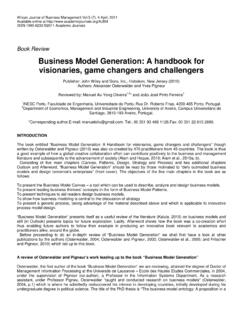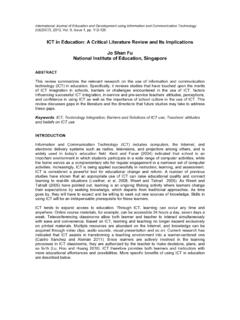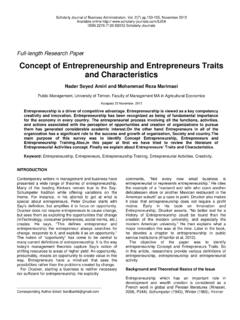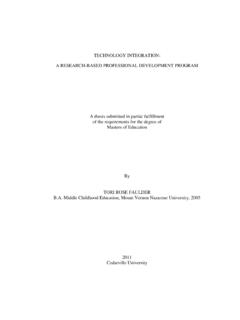Transcription of Entrepreneurship and entrepreneur: A review of literature ...
1 African Journal of Business Management Vol. 6(10), pp. 3570-3575, 14 March, 2012 Available online at DOI: ISSN 1993-8233 2012 Academic Journals review Entrepreneurship and entrepreneur: A review of literature concepts Sergiu Rusu , , Florin Isac , Radu Cureteanu * and Luiela Csorba 1 Faculty of Economics Sciences, Aurel Vlaicu University, Arad, Romania. 2 Faculty of Economics Sciences, University of Oradea, Romania. Accepted 16 January, 2012 The field of Entrepreneurship is still a relative one that is less explored, and many opinions in regard to defining the concepts of Entrepreneurship and entrepreneurs remain the same. A trial was made by this paper to explore the diversity of concepts identified in specialty literature , and this was approached in their historical evolution. Entrepreneurship entails forming a new organization or restructuring an organization which has already been in existence. It is often a complicated enterprise, so, consequently, numerous enterprises find loads of difficulties in survival.
2 This is an entirely different field involving unique personality traits on the part of the entrepreneur, such as good communication skills, patience, foresightedness, and many more traits, which heads his personality to a brighter side. We believe in opportunities for advancing understanding on the historical role of culture and values on entrepreneurial behavior, using more careful methodologies than in the past, and seeking to specify more exactly how important culture is relative to other variables. There still are major opportunities to complement research on the role of institutions in economic growth by exploring the precise relationship between institutions and entrepreneurs. Finally, conclusions are drawn and some future research directions outlined. Key words: Entrepreneurship , economy, management. INTRODUCTION The creation of dynamism and wealth of a country depends on the competitiveness of its companies, and this is fundamentally based, in its turn, on the capacities of the entrepreneurs and managers (Cuervo et al.)
3 , 2008). The Entrepreneurship is one of the fields with the most rapid evolution in economy, management, finance and even in legislation (Baron and Henry, 2010). More than 40 years ago, Baumol remarked that "the attempt to un-derstand the Entrepreneurship without the entrepreneur is like the attempt to understand Shakespeare without Hamlet." The field of Entrepreneurship enjoyed a special attention in specialized literature . Although, there is no *Corresponding author. E-mail: unanimously accepted definition of the entrepreneur or of the Entrepreneurship process, the specialists agree over their importance in the economic development (Nagy et al., 2010). This study is aimed at identifying relevant concepts from literature relating to Entrepreneurship and entrepre-neur. First, we intend presenting a historical perspective of the development of entrepreneurial thinking, at the same time synthesizing the conditions deemed as necessary to start an entrepreneurial activity, and the factors underlying the success as an entrepreneur.
4 Then, we sought to identify some of the problems arising in defining the Entrepreneurship concept, and the ways the main definitions have been summarized in the literature . We also proposed not to separate the concepts of entre-preneurship and entrepreneur in the study; the evolution of any of these two concepts is related to various changes when addressing the other concept. At the end of the literature review , we discuss the main findings and propose some possible future research directions. ENTREPRENEUR AND Entrepreneurship : THE PERSPECTIVE OF CONCEPTS Entrepreneurship is a multidimensional term that is extremely difficult to define (Carree and Thurik, 2005). This complicates the possibility of measuring the level of entrepreneurial activities and, as a consequence, their impact over the economic performance. Throughout history, entrepreneurial thinking has evolved with unpredictable twists and profound develop-ments (international trade, demand curves, competition as a discovery mechanism, the opportunity construct), offering new conceptualizations of actions that would have an entrepreneurial nature (Murphy et al.)
5 , 2006). Besides the fact that it presents a form of expression different from the modern era, the success of Entrepreneurship in ancient and medieval time depended on upgrading risk and institutional constraints. Thus, in Ancient Rome, around the year 50 BC, disposable incomes of entrepreneurial activity were according to social controls, regulations, and institutions. Personal accumulation of wealth has been accepted by the society as long as they do not involve the direct participation in industry and commerce, an area populated by former slaves. Wealth was generated from three main sources: land ownership, loans, and payments with political character. Early periods of the Middle Ages (500 to 1000 AD) have revealed new expressions of Entrepreneurship in Europe. Property and social status does not guarantee success because power and wealth were acquired primarily through military activity and war.
6 For entrepre-neurs of that time, opportunities for hostile acquisition of resources were part of their business activities (Baumol, 1990). In the last period of the Middle Ages (1000 to 1500 AD), pacifism introduced by the Church has reduced the proliferation of war, and activities such as architecture, engineering and agriculture have acquired entrepreneu-rial and lucrative character. Through these, development of Entrepreneurship has become more acceptable in social terms and is regarded as an activity that brings satisfaction from the economic aspect (Murphy et al., 2006). The term " Entrepreneurship " comes from the French term "entrepreneur". When we seek the first traces of the semantic concept of Entrepreneurship , it is important to mention the work of Verin (1982) which locates the historical origins of this term in the late 17th and early 18th centuries. It was thus identified two initial use of the term.
7 The first one, a person doing a civil engineering Rusu et al. 5371 construction with an established design and payment and the second, a fighter who wants a conquest, the typical spirit of the Middle Ages Crusades (Sanchez, 2011). The term "entrepreneur" appears for the first time in the text written by Cantillon (1755) entitled "Essai sur la Nature du Comerce en G n ral". The word refers to a person who purchases products at known prices and later resells them on the market at prices not known, bringing stability to the market system. Classical economic movement that followed Cantillon set the stage of balance models by promoting economic forecasting and the approach to uncertainty. Later, the term has been enriched by the differentiation made between entrepreneur and investor, recognizing the differences between their expectations in relation to the action taken. The main factors leading to successful Entrepreneurship in the vision of different authors was synthesized by Van Praag (1999) (Table 1).
8 There are numerous theoretical and empirical studies which consider that attributes like risk taking, innovation, the need of development and the managerial comp-etence are important qualities for the Entrepreneurship (Karlsson et al., 2004). The Entrepreneurship might be involved in an economic function, as bearer of uncertainty, as distributor of resources or as innovator. It might also refer to certain behaviour, inherent characteristics, creation of new organizations or the role of an owner or manager of a company (Figure 1). In the modern sense of market economy, an entre-preneur is an economic agent assuming an innovative and active behaviour, who deliberately accepts financial risks to develop new projects. To this extent, a significant number of companies give great attention and recognition to entrepreneurs; thanks to their contribution to the evolution of the entrepreneurial environment and the influence they have over the macroeconomic indicators.
9 Briefly, the Entrepreneurship , in the opinion of the economists, would be synonymous to the individual s accomplishments in the business field. But when the business has developed, the collective behaviour of the people within the organization becomes critical for its success. Thus, Entrepreneurship refers not only to the design of a business idea, but also to the projection and maintenance of the organization so that the activity may continue to take place (Panda, 2011). The one who literally invented the term entrepreneur, around the year 1800, was the French economist, Jean Baptiste Say; he considered the entrepreneur as a person who transfers resources from one person with a lower productivity to another with higher productivity and increased profit, thus creating value (Vlasceanu, 2010). As seen by Venkataraman (Klein, 2008), the academic sphere of Entrepreneurship incorporates in its filed explanations for the means in which the entrepreneurial 3572 Afr.
10 J. Bus. Manage. Table 1. Determinants of successful Entrepreneurship in the view of classical authors. Author Starting as an entrepreneur Success as an entrepreneur To start and to be a successful entrepreneur Cantillon Vigilance and caution Risk bearing Say Sufficient reputation to obtain capital Judgment, perseverance, knowledge of world, business and occupation To support risk Marshall Young people willing to take risks Intelligence, general ability (dependent on family background and education), knowledge of trade, bear the risk, leadership, to hold capital Schumpeter The desire to start (stronger if fewer alternatives for social distinction, more ambition, energy, creativity ) Leadership Knight Ability to raise capital, desire / motivation is important Ability to cope with uncertainty, trust in yourself, vision, intellectual capacity Luck Kirzner Vigilance creativity and leadership to exploit the profit opportunities Source: slightly adapted from Van Praag (1999).











